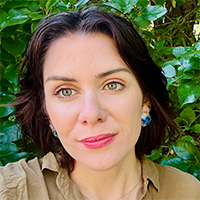Tom Howard/John H. Reid Fiction & Essay Contest 2024
Congratulations to the winners of the 2024 Tom Howard/John H. Reid Fiction & Essay Contest!
Honorable Mention $300
- Clea Bierman, Bottle Girl, Nonfiction
- Sarah Cadorette, I Don’t Know What Possessed Me, Nonfiction
- Juliana Delany, Trespass Point, Fiction
- Zoe Hiemstra, Pink Matter, Nonfiction
- Talya Jankovits, The Golem Mother of the Catskills, Fiction
- Rebekah McDermott, For All the Birthdays, Fiction
- Ilari Pass, Washing Light, Nonfiction
- Jason Prokowiew, The Demulcent of Shame, Nonfiction
- Arya Samuelson, I Am No Beekeeper, Nonfiction
- Jennie Stevenson, Sea Changes, Fiction
In our 2024 contest, 2,249 entries were judged by Mina Manchester with screening assistance from Sarah Halper. Ms. Manchester shares her thoughts below.
I often ask myself "What should writing do?" The winning stories and essays in this year's Tom Howard/John H. Reid Fiction & Essay Contest have answers.
The First Prize winner in Fiction, Kathleen McNamara's "Cryptozoology", takes the reader on a journey of becoming something else in the aftermath of war. An enlisted veteran finds his crippling back pain is caused by benign tumors. After a tragedy befalls his friend, another veteran and local chiropractor, the Sergeant First Class is forced to come to terms with the repercussions of wartime.
In the Honorable Mentions in Fiction, writers offer insight into how to live with loss in its myriad facets. In one story a mother loses both of her children, in another a woman loses her single child, only to have her brought back to life. Another woman, as she ages, tries to come to terms with her sister marrying the love of her life. Meanwhile, in a small beach town near Tokyo, a young man tries to understand who his father was after his death. These stories explore how loss provides perspective and changes you forever.
Fiction Honorable Mentions went to:
- Juliana Delany, "Trespass Point"—The beauty in this story comes from how the writer has slowed down, giving us the opportunity to observe the natural setting of a remote cabin on Somerset Bay from moment to moment. The passing of time is also at the heart of this conflict, as a woman nearing the end of her life decides to fight her younger sister for the right to live out her days as she chooses, against the backdrop of her sister's trespass in marrying the love of her life.
- Talya Jankovits, "The Golem Mother of the Catskills"—This tale recounts a summer in the Catskills in a Jewish enclave of women and children, where a widow's daughter drowns, only to be revived by the Rabbi. Strange and alluring at the same time, this story lingers in the imagination.
- Rebekah McDermott, "For All the Birthdays"—A woman spots her former husband at the grocery store, and they are confronted, five years after the loss of both of their children, with the new people they've become.
- Jennie Stevenson, "Sea Changes"—On a cold and forbidding beach on the coast outside Tokyo, a young man recounts his desolate childhood raised alone by his father and considers why the men in his family have struggled with women. After a bad breakup and a revealing visit with his father, they are visited by a sea nymph who crosses the gulf between father and son, and even life and death.
The First Prize winner in Nonfiction, Lanfu Liu's essay "Memory in Tibet", is a deeply thoughtful meditation on morality. Told from the perspective of a young Chinese man who becomes a teaching assistant in Tibet, he observes the circumstances of his pupils' lives alongside a Mandarin teacher who grieves the recent loss of her young daughter. In the essay, he wrestles with many questions, and at the end, must decide who to become.
In Nonfiction, the Honorable Mentions dwell on questions not only of how to be but of what to do. One woman is invited into a sacred community of people who wash and prepare the dead for burial, while in another essay, a young woman battles cocaine and alcohol addiction in two cities, trying to orient herself and settle in on the outcomes of different choices. A writer confronts unexpected grief after an abortion, while in another essay a man hesitates to reveal the shame of his abusive father. A well-researched essay explores women's rage in Korea and America, and another recounts verbatim the things men have said, contrasting these quotes with support received from female relationships and pondering how to fall in love when you've been hurt over and over.
Nonfiction Honorable Mentions went to:
- Clea Bierman, "Bottle Girl"—The voice in this piece is one I could listen to endlessly, for its forthrightness and confidence, even though the protagonist goes on a journey that is the opposite. This essay is the best kind of writing because even as Bottle Girl's bad decisions threatened to take her down, I was rooting for her the whole time.
- Sarah Cadorette, "I Don't Know What Possessed Me"—A woman recounts how patriarchal culture in Korea and America has repressed women's rage. The ways this anger seeks release are explored both on a cultural level and a personal level, and it's the distillation that crystallizes this work.
- Zoe Hiemstra, "Pink Matter"—This braided essay weaves together the thoughtless and often hurtful epithets men have said to the author with the feelings of love she has for both male romantic partners and female friends and family. The contrast offers a thought-provoking glimpse into gender, relationships, coming of age, and deciding boundaries for our own experience of love.
- Ilari Pass, "Washing Light"—A moving and melodic essay about a woman who is invited to wash the body of young woman who is the same age as her daughter, which slows down time to the most minuscule of observations. In this experience of preparing a body for death, this woman finds, inexplicably, joy.
- Jason Prokowiew, "The Demulcent of Shame"—A "demulcent" relieves pain, and in this essay, a man recounts how the bravery of discussing the abuse he received from his father works the same way for him. In a narrative that winds through time, the telling of these secrets, long-held, takes away their power, and the man is transformed into a new person, one who is no longer a prisoner of shame.
- Arya Samuelson, "I Am No Beekeeper"—A writer recounts her time at an artist residency, where she finds solidarity with other women artists, as well as the courage to face her lifelong fear of bees. Along the way, as she listens, shares, and learns from the others, she finds the strength to write about her abortion.
I encourage you to seek answers from these stories. Whether they help you feel less alone in your loss, or acknowledge a form of loss you didn't even know you had, you will find many ways to go on, even when it seems inconceivable. They will also help you consider how through the act of doing, we become. This is what writing at the highest level does—it imagines what might be.
We would like to recognize these finalists for their outstanding efforts: Penny Dahl, Jane Finlayson, Stephanie Green, Louise Hawes, Darla Himeles, Page Lambert, Nancy Philipp, Faith Shearin, and Jennifer Steil.
Learn more about our current Tom Howard/John H. Reid Fiction & Essay Contest.
Contest Judges

Mina Manchester
Mina Manchester is a past final judge of our Tom Howard/John H. Reid Fiction & Essay Contest. She is a Scandinavian-American writer chasing the sun in Los Angeles. An editorial assistant at new independent publisher Great Place Books, she holds an MFA from the Sewanee School of Letters. Her work has been featured in Electric Literature, The Evergreen Review, Columbia Journal, The Normal School, Inscape, HuffPost, and elsewhere. She's been a Finalist for The Masters Review Short Story Award, the Pinch Literary Award, the Annie Dillard Award in Creative Nonfiction, the Rick DeMarinis Short Story Award, honored by New Millennium Writings, and nominated for the UCLA James Kirkwood Prize. A former editor-at-large for Five South and assistant editor for Narrative Magazine, her workshop experience includes The Kenyon Review Writing Workshop, The Writer's Hotel, and Narrative's Art of the Story.
Photo by Emma Burdett
Contest Judges

Sarah Halper
Sarah Halper is an assistant judge of our North Street Book Prize and our Tom Howard/John H. Reid Fiction & Essay Contest. She earned her undergraduate degree in English History and Literature at Harvard and her graduate degree at The MFA Program for Writers at Warren Wilson College.









